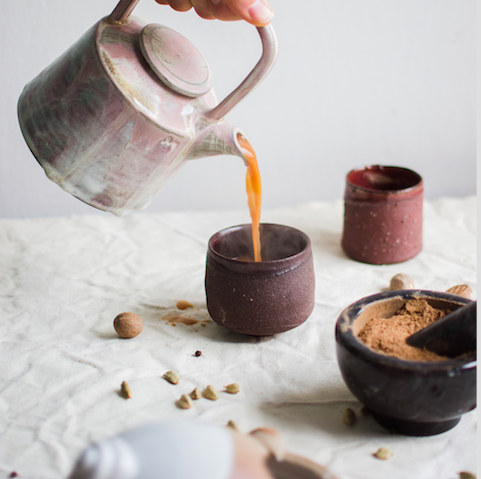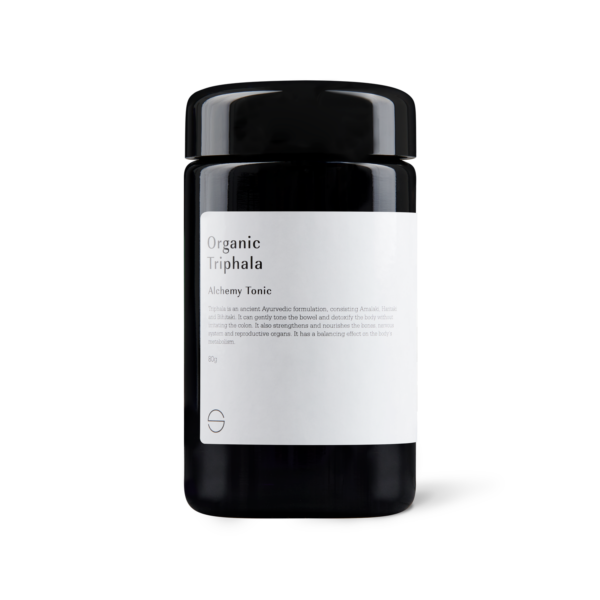
Beta-Glucans in Medicinal Mushrooms: The Healing Compound You Should Know About
In the world of tonic herbs and medicinal mushrooms, there’s

Kick-start, energise, rejuvenate
All carefully planned and prepared to help nourish, reset and rejuvenate the body and mind.

Triphala is a traditional herbal formulation that has been used for centuries in Ayurvedic medicine. The word “Triphala” is derived from Sanskrit, where “Tri” means three and “Phala” means fruit. Triphala is composed of three fruits: Amalaki (Emblica officinalis or Indian gooseberry), Bibhitaki (Terminalia bellirica), and Haritaki (Terminalia chebula).
Each fruit in Triphala offers unique properties and health benefits. Amalaki is known for its high content of vitamin C and antioxidants, which can help support the immune system and promote healthy skin. Bibhitaki is often used for its mild laxative properties and its potential to support digestion. Haritaki is considered a rejuvenating herb that may support digestive health, detoxification, and overall well-being.
The combination of these three fruits in Triphala creates a powerful synergistic effect, making it a popular herbal remedy in Ayurvedic medicine. Here are some potential benefits associated with Triphala:

our organic triphala here
Here are some ways to use Triphala in your holistic self-care
if taking internally it is recommended to take Triphala either 30 minutes before food intake or at least 1-2 hours post-meal.
Take 1/2 teaspoon of Triphala and steep it in 1/2 cup of warm water for 3-5 minutes. Stir well and drink down the mixture making sure to take in any sediment that may accumulate at the bottom. Drink this each night before bed.
add 1 teaspoon of Triphala to 1 cup of warm water*. Allow it to steep for 5 minutes, then give it a good stir. Drink the mixture, ensuring you consume any sediment that settles at the bottom. It is recommended to take this preparation every night before going to bed.
In cases of more severe constipation, the same dosage can be repeated in the morning on an empty stomach until regular bowel movements are established. Once constipation subsides, the dosage can be reduced to 1/2 teaspoon before bedtime only.
hair growth: gently massage a small amount of triphala onto your scalp and wet hair. Leave it on for 2 minutes and then rinse it off with water.
preventing hair loss and dandruff: Mix three tablespoons of fresh aloe vera juice with an equal amount of Triphala powder to form a thick paste. Apply it to your scalp and along the length of your hair, allowing it to sit for 30 minutes. Then, wash it off with lukewarm water.
preventing premature hair graying: Heat 3-4 tablespoons of pure coconut oil in a pan on low heat. Add 2 tablespoons of Triphala powder and stir well until it forms a thick paste. Once cooled, apply this paste to your scalp and hair, massaging it gently. Leave it on for 20-30 minutes before rinsing it out with water.
For controlling hair fall and dandruff: Boil Triphala powder in a cup of water along with one tablespoon of fenugreek seeds for 10 minutes. Strain the liquid into a glass jar and add a few drops of lemon juice. Massage this mixture gently
Hair rinse to encourage vibrant color and thick healthy hair: boiling 4 tablespoons of triphala powder with 1 quart of water. If your hair is dry, frizzy, or depleted, add 2 tablespoons of sesame oil. Allow the decoction to boil for 10 minutes before removing from the heat to cool
To prepare a triphala eye wash, start by boiling ½ teaspoon of triphala powder in 1 cup of water for 2 minutes. Afterwards, strain the tea multiple times using a cheesecloth to ensure there are no particles remaining. This step is crucial to avoid any potential eye irritation.
Allow the tea to cool completely before using it to wash your eyes. If you have an eye washing cup, it is recommended to use it for better circulation and thorough cleansing.
Blinking while washing can also help distribute the tea evenly across the eye area.
Cleansing: Create a paste by mixing Triphala powder with water and use it as your daily face wash. Gently massage your face with the paste twice a day, ensuring to avoid the eye area. Once the paste dries, rinse your face thoroughly with water to remove it.
Triphala for Acne: Combine 2 tablespoons of Triphala churna with 1 cup of chickpea flour, 1 tablespoon of neem powder, 2 tablespoons of hibiscus powder, and 2 tablespoons of brahmi. Add honey to form a paste. Apply this mixture to your acne and acne spots, leaving it on for 30 minutes. Instead of rinsing your face with running water, use a soft, clean cloth dampened with lukewarm water to gently remove the paste.
To utilize triphala for oral care, create a paste by mixing a small amount of triphala powder with warm water. Use your toothbrush to scrub your teeth and gently massage your gums with the paste. Triphala’s cleansing properties may leave your mouth feeling slightly dry, so it is recommended to rinse with warm water afterward or engage in a few minutes of oil pulling with Daily Swish Oil.
For individuals with extra-sensitive, red, or irritated gums, a triphala mouthwash can be an alternative to the herbal toothpaste. Prepare triphala tea, strain it thoroughly, and allow it to cool. Then, swish and gargle the tea to cleanse your mouth without causing further irritation.
Pigmentation: Combine 2 tablespoons of Triphala powder with sesame oil for vata dominant skin, rosewater for pitta dominant skin, or just water for kapha dominant skin. Apply the mixture to your face and leave it on for 15-30 minutes. Once it dries, wash it off with lukewarm water. Follow up by steaming your face and repeat this process twice a week for optimal results.

In the world of tonic herbs and medicinal mushrooms, there’s

As the days grow shorter and the air becomes crisp,

Marine phytoplankton, the microscopic organisms that form the foundation of
Copyright Shoku Iku © 2024 | All Rights Reserved.
The statements on this website have not been evaluated by the TGA or FDA. These products are not intended to diagnose, treat, cure or prevent any disease.
Sign up to receive your discount.